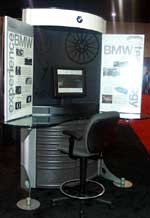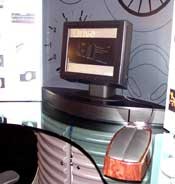News
Kiosks in the Fast Lane
Luxury automobile manufacturer BMW has launched the latest generation of its showroom kiosks, and everyone involved is convinced this project will not run out of gas.
May 29, 2004
As enthusiastic as Mike Mayer is about the kiosk industry -- and the president of kiosk enclosure manufacturer Frank Mayer & Associates Inc. is bullish on kiosks -- he has kicked the glad tidings up a notch in recent months.
The source of his zeal is a silver and black enclosure with a glass base supporting a touchscreen monitor. At the touch of the screen, it fills with images of a fast, luxury automobile, streaking down a country road in the middle of the night while its driver fends off the attention of a van full of high-tech jewel thieves, eager to shanghai his passenger's precious cargo.
As Mayer sees it, the kiosk is flashy, yet sophisticated; exciting, yet practical. The practicality is the key to the entire program, because the kiosk is designed to sell cars. Not just any car, mind you, but BMWs.
The kiosk is the latest project for BMW, which is attempting to build on its automotive cache with a sleek kiosk program that helps salesmen in offering the company's automotive lines.
"It is a jewel in our crown," said Mayer, who was speaking for his company and, in a broader sense, the entire kiosk industry. "To me, it's the pinnacle of controlling the brand image in a retail location. And, hey, it's BMW."
 |
The use of strong lines and stark colors gives BMW's Virtual Sales Center a sleek, aerodynamic look. |
The luxury automobile manufacturer is in the process of deploying the kiosks, known as BMW Virtual Sales Centers, in all 348 dealerships throughout the United States. Each dealership will have one kiosk in its showroom to display BMW's various lines.
The kiosks are a collaborative effort between Frank Mayer & Associates, which constructed the enclosures, Netkey Inc., which provided the software and remote management system, and project manager reality pictures ltd., which produced the content for the kiosks and managed the vendors. The rollout began on Jan. 12 and will not finish until around May 1, but BMW has quickly gotten the kind of feedback that suggests the project will be a success.
"We've already had dealers call and ask if they can have another unit, which we didn't anticipate," said Holly Babich, BMW of North America consumer events manager. "We thought one would be enough. Maybe we'll create a portable unit in the future."
Form and function
The Virtual Sales Center is not BMW's first attempt at providing information to customers through kiosks. The company introduced its first kiosk in 1995 and has used them as a sales tool ever since.
But in 1999, BMW officials decided that the original kiosks, which featured software platforms that had to be updated through the burning of new CDs, were no longer a fit with the company's direction.
"The kiosks were outdated and didn't sit with our philosophy of the BMW being technologically advanced," Babich said.
BMW already had a strong presence on the Internet, with a Web site that offers detailed information on the company's automobiles. A series of brainstorming sessions determined that the Web site should play a significant role in the new kiosk program. But Babich said more was required of the kiosk than just an Internet regurgitation.
"We wanted to make it experiential rather than just informative," she said. "We wanted to get an experience on the kiosk that you wouldn't get at home while making it informative as well."
As a result, the kiosk features elements from the company's Web site, including brand information and a section that allows customers to customize their own vehicles, from model to colors to accessories. But it also features a series of short films BMW commissioned from the likes of noted directors John Frankenheimer and Guy Ritchie to promote the company's cars.
To enhance the customer experience at the kiosk, BMW had the units designed with the same Harman Kardon speakers used in its cars, giving the action sequences in Frankenheimer's film, "Ambush," an added sonic oomph.
"BMW has a high brand image and they're trying to drive that brand image (through the kiosk) with the movies they've used and the Web site technology they've used," said Bob Ventresca, Netkey director of marketing. "It is important to always have that consistent message. It makes sure your sales people are communicating that same message every time."
The communications dynamic -- from kiosk to sales staff to customer -- is one that BMW is familiar with and has addressed.
Buying sales staff into a retail-based kiosk deployment is often one of the greatest challenges a retailer faces, as salespeople often go in with the perception that the kiosk is there to make sales and deny them commissions. Having done kiosk deployments before, BMW understood that. The Virtual Sales Centers are designed to accommodate two chairs, so sales staff can sit with customers rather than stand over them. And the company has a training program designed for current and future employees.
"Because the kiosk has so much information (the sales staff) needs a little mini course on what's on it and how to navigate it," Babich said. BMW created a kiosk-based tutorial on navigating the kiosk and its functions. Said Babich, "If the dealer hires someone new and the kiosk is standing there they can go to it and actually learn how to use it."
Let's work together
BMW spent nearly three years getting the Virtual Sales Center from concept to rollout. Early in the process, reality pictures was brought in to develop the content, and BMW put out requests for proposal for a manufacturer and selected Frank Mayer for the enclosure, with Netkey coming aboard as the software provider. Babich said both companies met BMW's expectations for thinking outside the box.
"It was an incredibly cohesive team effort," Babich said. "Every member was 100 percent excited about the possibilities. That was the direction we gave people. I told Frank Mayer and Netkey that I didn't want to know what companies X, Y, and Z did. I wanted them to break the mode."
BMW wanted a kiosk that would reflect the company's high-end image while blending into the showroom atmosphere. They also wanted a system that could be remotely managed, so content could be updated quickly and efficiently at all locations.
The resultant kiosk includes full-motion, video-quality Web content, static graphics, and peripheral devices from BMW models. A joystick-style device, recently added to some models to control environmental functions within the cars, is available at the kiosk so drivers can become accustomed to it.
 |
BMW's Virtual Sales Center includes a joystick-style apparatus to test various functionality items on each car. |
BMW's passion for the project drove everyone involved in developing the kiosk, said Allen Buchholz, Frank Mayer executive vice president of marketing.
"The early decision makers were more in tune to the entire vision," Buchholz said. "That allowed us to go out and get the best partners."
Added Mike Mayer: "What really allowed this to be a success was BMW itself. Their IT and marketing people worked hand in hand from the start. In every meeting they were there with all the other partners."
An investment in the future
While the BMW project has the potential to be a high-profile success for Netkey and Frank Mayer, Ventresca believes the kiosk industry overall should benefit from BMW's reputation and profile in the luxury car industry.
"It's really important for our industry as a whole that BMW thinks kiosks are important for how to market their cars," Ventresca said.
BMW's profile as an upscale automobile maker is important, but the company's worldwide scope helps as well. BMW Group, BMW of North America's parent company, manages BMW operations on six continents. The company reported a net profit of 1.87 billion Euros (about $1.65 billion) on revenue of about 38.5 billion Euros (about $33.9 billion) during fiscal year 2002.
Babich would not disclose how much the company invested in the kiosk project, but hinted that BMW treated the project seriously.
"It's a huge investment, a substantial investment," she said. "We as a company were so committed to it that we did not ask the dealers to contribute a dime. The entire cost is ours, for the pilot program, shipping, connectivity, and keeping it current."
"It is a jewel in our crown. To me, it's the pinnacle of controlling the brand image in a retail location. And, hey, it's BMW." Mike Mayer President, Frank Mayer & Associates Inc. |
While BMW is still rolling out the Virtual Sales Centers to its dealerships, Babich said the company is planning ahead for the next generation of BMW kiosks.
"Everybody here is really, really excited and even more excited because we have so much opportunity to build on this," she said. "We're already brainstorming on the next level. Our philosophy is to stay five steps ahead."
Included In This Story
Frank Mayer and Associates
Kiosk Design | Manufacturer
Frank Mayer Kiosks and Displays specializes in large-scale rollouts of custom digital kiosks for enterprise and growth-oriented brands. With a relentless focus on premium design, customization, and end-to-end service, we manufacture self-service customer engagement solutions that expand market reach, boost sales, and enhance brand equity.










